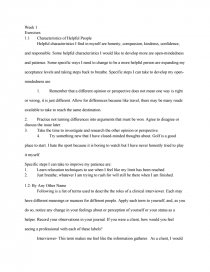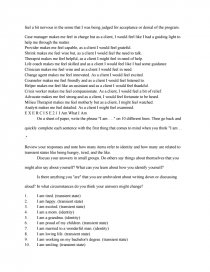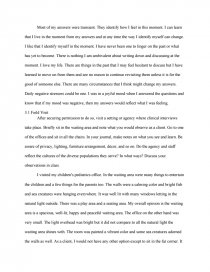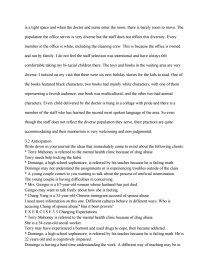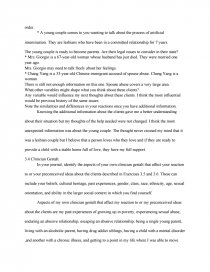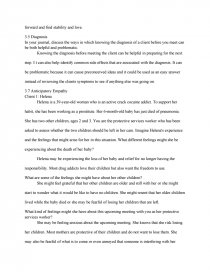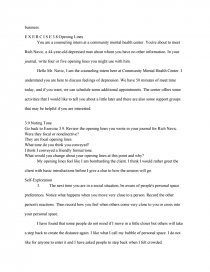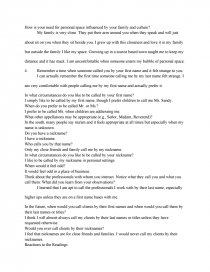Helpful People
Essay by juswondring • December 24, 2012 • Research Paper • 2,986 Words (12 Pages) • 1,659 Views
Week 1
Exercises
1.1 Characteristics of Helpful People
Helpful characteristics I find in myself are honesty, compassion, kindness, confidence, and responsible. Some helpful characteristics I would like to develop more are open-mindedness and patience. Some specific ways I need to change to be a more helpful person are expanding my acceptance levels and taking steps back to breathe. Specific steps I can take to develop my open-mindedness are:
1. Remember that a different opinion or perspective does not mean one way is right or wrong, it is just different. Allow for differences because like travel, there may be many roads available to take to reach the same destination.
2. Practice not turning differences into arguments that must be won. Agree to disagree or discuss the issue later.
3. Take the time to investigate and research the other opinion or perspective.
4. Try something new that I have closed-minded thoughts about. Golf is a good place to start. I hate the sport because it is boring to watch but I have never honestly tried to play it myself.
Specific steps I can take to improve my patience are:
1. Learn relaxation techniques to use when I feel like my limit has been reached
2. Just breathe; whatever I am trying to rush for will still be there when I am finished.
1.2: By Any Other Name
Following is a list of terms used to describe the roles of a clinical interviewer. Each may have different meanings or nuances for different people. Apply each term to yourself, and, as you do so, notice any change in your feelings about or perception of yourself or your status as a helper. Record your observations in your journal. If you were a client, how would you feel seeing a professional with each of these labels?
Interviewer- This term makes me feel like the information gatherer. As a client, I would feel a bit nervous in the sense that I was being judged for acceptance or denial of the program.
Case manager makes me feel in charge but as a client, I would feel like I had a guiding light to help me through the matter.
Provider makes me feel capable, as a client I would feel grateful.
Shrink makes me feel wise but, as a client I would feel the need to talk.
Therapist makes me feel helpful, as a client I might feel in need of help.
Life coach makes me feel skilled and as a client I would feel like I had some guidance
Clinician makes me feel wise and as a client I would feel in need.
Change agent makes me feel innovated. As a client I would feel excited.
Counselor makes me feel friendly and as a client I would feel listened to.
Helper makes me feel like an assistant and as a client I would feel thankful.
Crisis worker makes me feel compassionate. As a client, I would feel a bit of relief.
Advocate makes me feel strong and as a client, I would feel fortunate to be heard.
Milieu Therapist makes me feel motherly but as a client, I might feel watched.
Analyst makes me feel detailed. As a client I might feel examined.
E X E R C I S E 2.1 I Am What I Am
On a sheet of paper, write the phrase "I am . . ." on 10 different lines. Then go back and quickly complete each sentence with the first thing that comes to mind when you think "I am . . ."
Review your responses and note how many items refer to identity and how many are related to transient states like being hungry, tired, and the like.
Discuss your answers in small groups. Do others say things about themselves that you might also say about yourself? What can you learn about how you identify yourself?
Is there anything you "are" that you are ambivalent about writing down or discussing aloud? In what circumstances do you think your answers might change?
1. I am tired. (transient state)
2. I am happy. (transient state)
3. I am excited. (transient state)
4. I am a mom. (identity)
5. I am a grandma. (identity)
6. I am proud of my children. (transient state)
7. I am married to a wonderful man. (identity)
8. I am loving life. (transient state)
9. I am working on my bachelor's degree. (transient state)
10. I am smiling. (transient state)
Most of my answers were transient. They identify how I feel in this moment. I can learn that I live in the moment from my answers and at any time the way I identify myself can change. I like that I identify myself in the moment. I have never been one to linger on the past or what has yet to become. There is nothing I am ambivalent about writing down and discussing at the moment. I love my life. There are things in the past that I may feel hesitant to discuss but I have learned to move on from them and see no reason to continue revisiting them unless it is for the good of someone else. There are many circumstances that I think might change my answers. Daily negative stressors could be one. I was in a joyful mood when I answered the questions and know that if my mood was negative, then my answers would reflect what I was feeling.
3.1 Field Visit
After securing permission to do so, visit a setting or agency where clinical interviews take place. Briefly sit in the waiting area and note what you would observe as a client. Go to one of the offices and sit in all the chairs. In your journal, make notes on what you see and learn. Be aware of privacy, lighting, furniture arrangement, décor, and so on. Do the agency and staff reflect the cultures of the diverse populations they serve? In what ways? Discuss your observations in class.
I visited my children's pediatrics office. In the waiting area were many things to entertain the children and a few things for the parents too. The walls were a calming color and bright fish and sea creatures were hanging everywhere.
...
...
